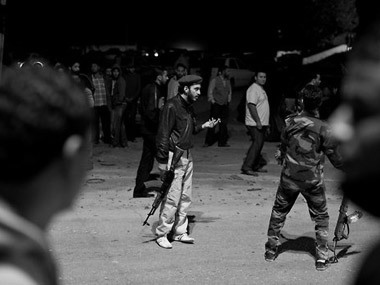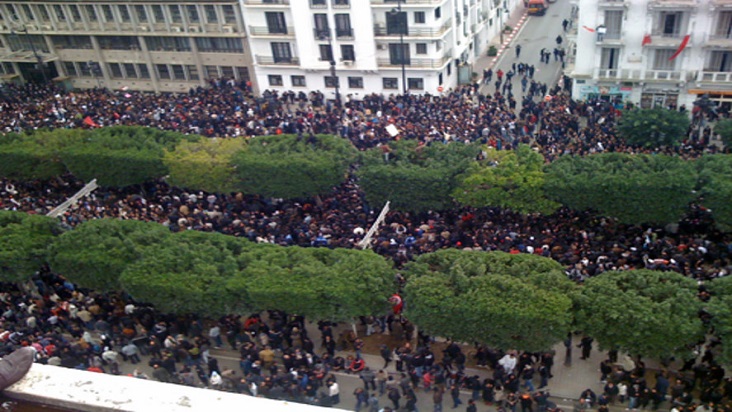By: Alexander Corbeil
Clashes in Tripoli last week between rival militias from Zintan and Misrata highlight a disturbing trend in post-Gaddafi Libya. With the powerful tyrant now dead and his forces thwarted by a combined Libyan-NATO effort, a power vacuum has emerged. The National Transition Council’s leader Mustafa Abdel-Jalil warned that Libya faced “bitter options” in the government’s campaign to disarm rebel fighters. Abdel-Jalil went on to say that if these militias did not disarm, the country would soon face a civil war. The transitional Libyan leader was not exaggerating, the International Crisis Group estimates that there are roughly 125,000 Libyans still under arms in an estimated 100 different militia organizations. These rag-tag groups of fighters, labeling themselves as brigades, pose a serious security threat to the consolidation of state-power in Libya. Without a solidified national government or armed forces de-facto authority has been granted to those possessing arms. While these militias have undertaken much needed security and policing duties, a culture of warlordism is emerging that threatens the stability ofLibya.
The Systemic Roots of the Current Crisis
Two core issues have permeated the Libyan political landscape and allowed for the creation of an atmosphere of mistrust and rigid regional-based loyalties. The first stems from the practices employed by the Gaddafi regime during his four-decade long rule. Gaddafi centered authoritarian control around himself and his family, ignoring central state institutions in favor of a complex system of political brinksmanship that played identity groups and regional actors against one another. This ensured that those involved in the national institutions, most notably the state military, were kept weak and thus unable to challenge Gaddafi’s rule. In 1993, after an assassination attempt by the country’s largest tribe the Warfalah , Gaddafi “tribalized” his rule by pitting different clans against one another. Due to this process,Libya has remained as divided as ever in this post-Gaddafi quagmire. Without a national sense of belonging, which could have been fermented with years of institutional linkages, militia allegiances are predominantly based on geographical identities as fighters are loyal to their city-based “brigades.”
The second legacy, stemming from the revolution that overthrow Gaddafi’s rule, was the way in which the fight to topple the “Brother Leader” was waged. Although the NTC was touted by the international community as the leading force of the revolution and in charge of on-the-ground military operations, in reality it was very much a piecemeal undertaking. Gaddafi was toppled through a variegated liberation of different parts of the country with little centralized command. This was especially true in the western regions, where autonomous, self-armed and self-trained forces led the uprising against Gaddafi. Many of these groups believe that they did not receive enough support from the NTC headquarters in Benghazi, and in turn, waged the war against Gaddafi independently. Thus, these groups all legitimately claim to have sacrificed both men and money in their endeavour, and consider themselves national liberators. With revolutionary credentials bestowed upon each independent militia, there is not one group within Libya that can present itself as the vanguard of the revolution. This is particularly true for the militias hailing from Tripoli, Zintan, and Misrata who all believe that they spearheaded the revolution in the west, freed the capital, and suffered the worst onslaught of Gaddafi’s forces.
The NTC’s Legitimacy Deficit
The NTC’s legitimacy issues began during the fight to oust Gaddafi. As the council was based in Benghazi and led by former elements of the regime, many militias in the west viewed the organization with dismay. Underpinning this cautious approach is the historically deep-rooted mistrust between eastern and western regions of the country. The western militias, lacking support from Benghazi, accused the NTC of playing a marginal role in the uprising. This legacy has transferred over into the post-Gaddafi landscape, ensuring that armed groups both distrust the NTC, and refuse to be subservient to the organization.
The NTC has also incited suspicions among both the Libyan populace and militia units. The organization has morphed into a government that is both secretive and inefficient, adding to its legitimacy problem. Two main factors have dominated the political landscape and have resulted in a climate of mistrust. The first is the refusal of the NTC to make its membership list public. As the Libyan population is wary of allowing elements of the former regime into the country’s new governing structure, the NTC’s unwillingness may be due to the fact that a large portion of its governing body is composed of ex-Gaddafi loyalists. The second issue is one of a fiscal nature, and is key to the economic recovery of the Libyan nation. The NTC has yet to open the books on what is being done with the country’s oil revenue. As the country with the eighth largest oil reserves in the world, pumping 260,000 barrels per day, Libyans rightly believe that this lucrative source of revenue should be accounted for and utilized to rebuild the nation.
Civil Unrest in Bani Walid and Benghazi

The NTC’s waning legitimacy has led to two uprisings in the past month. On January 23rd local tribesman from the Warfalah tribe in Bani Walid drove out militiamen from the former Gaddafi stronghold. While initial reports suggested that Gaddafi loyalists had retaken the town and hoisted the dictator’s green flag, in reality this was a move by residents to reassert their own control over the town. Having historically received a degree of autonomy under Gaddafi’s rule, the Warfalah did not take kindly to the occupation of their town by militia men from other areas. On January 25th, the NTC’s defence minister recognized the new local council which was established after the ouster of militia forces. In order to avoid further bloodshed, the NTC set a precedent which will have further ramifications on its ability to concretely govern the country. By allowing the elders of Bani Walid to establish a de-facto town-based governance structure, the NTC highlighted its inability to project its power across the country. Furthermore, by allowing for the creation of a town council not subservient to the NTC, it sent a signal to other more powerful armed groups such as the Zintan and Misrata factions, that concessions can be obtained by armed force.
Armed insurrections are not the only issue plaguing the NTC in its drive to govern the entirety of Libya. Two days before the January 23rd takeover of Bani Walid, around 200 protestors stormed the offices of the NTC in Benghazi, forcing Abdel-Jalil to flee the city. The assault on the NTC compound came after two weeks of protests aimed at forcing the organization to shift to a more transparent governing system while taking into consideration the needs of the people of Benghazi. Issues included a lack of compensation for those who fought the regime, subsidized medical care for those injured during the uprising, and the adoption of an electoral law which did not involve public consultation. In response to the uprising, Abdel Hafiz Ghoga, the vice-president of the NTC, resigned while warning that the continuance of protests could drag Libya into a “bottomless pit.” For his part, Abdel-Jalil, begged the Libyan population to give the government more time, stating that it had only been functioning for two months and required at least another two months to acquire the monetary resources needed to run the country in an efficient way. To placate the protestors the NTC announced that the Economic and Oil Ministries would be moved toBenghazi while the Finance Ministry would shift to Misrata.
The Emerging Culture of Warlordism

The real power in Libyalies not with the NTC but rather with the country’s plurality of militia organizations. Tripoli, the epicenter of militia activity, has been divided into roughly 11 different militia enclaves, each with its own command structure and authority base. These fiefdoms in the nation’s capital are important bargaining chips for the militias in their attempts to generate more clout in post-Gaddafi Libya. In order to be fully represented in any resulting political structure, militia leaders see occupation of the capital as highly advantageous both in forwarding this goal and to reap monetary benefits from state institutions. Another main sticking point that has occurred is a demand by the militias for the ouster of any senior political or military officials who had previously been loyal to Gaddafi, and in turn, replacing them with officials who had fought during the war.
Of the 11 factions in Tripolitwo have come to dominate the political scene due to the size of their standing armies and reported valor of their men. These groups are the Zintan and Misrata “brigades” which have supposedly created a de-facto alliance to bolster their position vis-à-vis the NTC. Although this alliance is now in doubt given reports of clashes between the two militias in Tripoli, both groups independently pose a serious threat to the NTC. In order to placate these militias the NTC appointed representatives from each city to the interim cabinet. The current Defence Minister is Usama al-Juwali who hails from Zintan and is a former officer in the Zintan army. The Interior Minister position was given to Fawzi Abdul Aal, a lawyer from Misrata. While it is gratifying that neither man is a warlord, the inclusion of both actors highlights the inability to govern without the incorporation of negative vested interests. Furthermore, these reconciliatory steps did not result in any concrete moves by the militias to disband, or to remove their troops from the streets of Tripoli.
While the NTC had ordered militias to leave the capital by December 20th, none of the 11 groups took the government’s directive seriously. Violence in the capital has escalated with clashes occurring almost nightly between the various militia groups. The presence of various brigades has ensured the occurrence of armed standoffs as they overlap their jurisdictions and compete for the most lucrative properties in the sea-side city. In combination with these outbreaks of violence, both the Zintan and Misrata militias have involved themselves in deplorable acts while presenting themselves as “policeman, judges, and executioners.” The Misrata militia has been accused of raiding a refugee camp in Tawergha five to six times, in the process dragging away dozens of people they blame for aiding Gaddafi in the assault on their hometown. For their part, the Zintan group is being blamed for torturing and killing Omar Brebesh, the former Libyan Ambassador toFrance after he reported for questioning on January 19th. It still remains unclear as to why the former diplomat was murdered given the fact that he had begun working for the NTC during the uprising.

In addition to these violent acts there are two main issues revolving around the Zintan militia and their powerful position in the post-Gaddafi realm, the first and most prominent of which is the continued detention of Saif al-Islam Gaddafi, the dictator’s most prominent son and previously his presumed successor. Although the NTC has requested that the Zintan militia hand over the dictator’s son, he remains in their custody as a useful bargaining chip in order to gain concessions from the central government. Coupled with the fact that the Zintanis currently occupy Tripoli’s international airport, again as another bargaining chip in negotiations with the NTC, the political clout of this militia is surely not going to fade anytime soon.
The Path Forward
In order to achieve any sort of political stability and the creation of a responsible governing system dependent on the support of the Libyan population, the militias must first be disarmed. According to the new Deputy Prime Minister Mustafa Abushagur one third of armed militiamen who liberated Tripoli have stayed in the capital presenting a serious security concern. According to Abushagur the NTC hopes within five months to have a program to survey militia members’ skills and place them in appropriate training courses or jobs. Out of these reintegrated fighters, 25,000 would be placed in military and police positions, with a third of the 125,000 armed Libyans being employed in government positions. Granted, these figures seem extremely optimistic but the base structure of disarming and integrating former rebels in to the various institutions of governance is a worthwhile and much needed endeavor.
The current security patchwork should be dealt with by the NTC in combination with local military and civilian councils in order to provide a stable disarmament campaign. This transition represents a crucial stage in post-war development but is also very treacherous as any perceived threat to militia prerogatives is sure to result in violent clashes and in turn the possibility of civil war. First, a set of standards must be developed in order to curb the open display and use of arms, especially in and around Tripoli where the most violent of clashes have occurred. These guidelines should be bolstered by clear rules regarding the treatment of detainees and discriminatory practices against communities which previously supported the Gaddafi regime. To hasten the disarmament of militia members both the police and military must be allowed to train and incorporate members of various groups from across the geographical and tribal spectrum.
In addition to integration into the law enforcement arms of the state, the NTC must provide robust economic opportunities for former fighters whether through educational programs or government employment. The monetary funds needed for these programs will become available once foreign banks free Libyan assets, and institutional devices to disseminate oil revenue are put in place. In light of the comments by Mustafa Abushagur, it seems that the NTC is fully aware of this need, the only issue now being the proper implementation and financing of such a plan. The international community for its part must provide assistance both in the restructuring of central governing institutions and through demobilization and reintegration practices utilized in Iraq, which were seen as largely successful.
Further Reading:
International Crisis Group: Holding Libya Together ; Al Jazeera: Who is Really Controlling Libya? ; Libya: Ruling Council’s Authority Challenged in Former Pro-Gaddafi Stronghold ‘; Protestors Attack NTC’s Benghazi Headquarters ; The Lessons of Bani Walid ; Libya Struggles to Disarm Fighters




